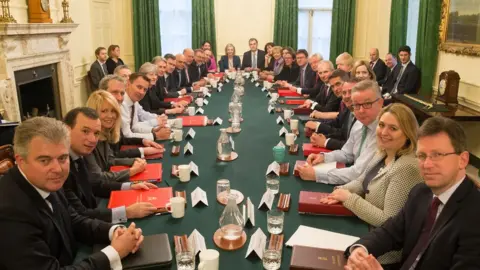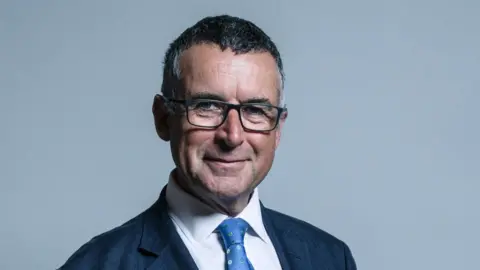Amber Rudd hits back at Tory Brexiteers
Home Secretary Amber Rudd has hit back at Tory Brexiteers over attacks on the civil service and claims of disunity.
Ms Rudd said backbencher Jacob Rees-Mogg was "wrong" to accuse the Treasury of "fiddling the figures" with forecasts showing the UK would be worse off outside the EU.
The leaked forecast that sparked the row was a cross-departmental "tool" to "help inform the debate", she said.
And she said ministers were more united over Brexit than critics claim.
Speaking on the BBC's Andrew Marr show, she said she was "not intimidated" by Brexiteers' warnings over the customs union and that the UK government would not "surrender too quickly" in its battle for a "bespoke" trade deal with the EU.
Negotiations are taking place between the UK and the EU ahead of the UK's scheduled exit in March 2019.
Ahead of a week of key meetings, Theresa May is facing growing calls to set out in detail what she wants to secure - in particular how closely-bound the UK will be to the EU after it leaves.
Writing in the Sunday Telegraph, Bernard Jenkin, a Conservative MP who was a key Leave campaigner, accused the government of being "vague" and "divided" on the issue.
But Ms Rudd told Andrew Marr she had "a surprise for the Brexiteers", that the key Brexit committee of ministers was "more united than they think".
The cabinet agrees on the need for "frictionless trade", the ability to strike international trade deals and avoid a hard border in Ireland, she said.
And on the key point of the customs union - which currently prevents the UK from striking international trade deals - she suggested "a form of customs agreement" would be needed.
Last week International Trade Secretary Liam Fox said it was "very difficult" to see how staying in a customs union would allow the UK to have an "independent trade policy" after Brexit.

Is the cabinet really united?
BBC political correspondent Susana Mendonca
 Getty Images
Getty ImagesThe accusations of cabinet divisions and disunity have kept coming from Brexit-supporting MPs over the past week. Now the home secretary has pushed back, saying the cabinet is "more united than they think".
If that is the case, the cabinet will be expected to demonstrate some of that unity this week when discussions between Theresa May, David Davis and EU negotiator Michel Barnier are bound to throw up some bones of contention - the transition deal being the main one. Will the cabinet be singing from the same hymn sheet on that? And what about the customs union, another thorny issue that key ministers have very different views on?
To silence its detractors, the cabinet will have to demonstrate this week it is neither "vague" nor "divided" - but whatever approach it comes up with is likely to lead to divisions with those who think they are going too far or not far enough.

The role of the civil service has been thrust into the limelight in recent days by a leaked analysis predicting an economic hit to the UK after Brexit.
Ms Rudd said the report did not "model everything" and predicted the UK economy would "absolutely grow" after Brexit, but said putting up trade barriers would have "consequences".
Describing the civil service as the envy of the world, she added: "We have to have these forecasts before making decisions."
She said she had been "surprised" at Mr Rees-Mogg's remarks and added that ministerial Brexit colleague Steve Baker - who has clashed with Whitehall unions and apologised to Parliament - had had an "interesting week".
Mr Baker's apology followed a Commons exchange after which he was accused of not challenging Mr Rees-Mogg's suggestion of Treasury bias against Brexit.
On the BBC's Sunday Politics, Conservative Party Chairman Brandon Lewis echoed Ms Rudd in saying Mr Rees-Mogg was wrong and defending Whitehall.
Former top civil servants have also hit back at critics.
Speaking on ITV's Peston on Sunday, ex-cabinet secretary Lord O'Donnell said claims officials were distorting figures were "crazy".
People who do not like their analysis tend to shoot the "messenger", he said.
"We look at the evidence and we go where it is.
"Of course if you are selling snake oil, you don't like the idea of experts testing your products."
His predecessor Andrew Turnbull, who was cabinet secretary under Tony Blair, told the Observer that attacks on the civil service were similar to tactics used by German nationalists between the two world wars.

Customs in the spotlight
BBC business reporter Rob Young
Customs union members each apply the same tariff to goods bought from outside the EU. Goods from inside the EU are not subject to tariffs.
Theresa May says Britain is leaving the customs union - so what will replace it?
For a lot of firms, customs rules are just as important as a trade deal. Brexit could disrupt many supply chains, if businesses buy parts from Germany or Italy, for example. Many exporters want a new customs deal with the EU to reduce the need for border checks - limiting queues and paperwork. But this could restrict Britain's ability to strike international trade deals outside the EU.
Some worry this undermines one of the key potential benefits of Brexit.
Customs are also key to the future border with Ireland. No wonder this is one of the thorniest issues arising from Brexit.

The UK and the EU do not currently agree on whether EU citizens moving to the UK during the planned two-year transition period after Brexit should get the same long-term rights as those who arrive before the UK leaves.
Defending the UK's position, Ms Rudd said it was "right to have a distinction between before March 2019 and afterwards".
Chancellor Philip Hammond has been the focus of much of the criticism from Brexiteers in the Conservative Party, and in his Telegraph article Mr Jenkin suggested Mr Hammond was not toeing the party line.
"If ministers are vague or divided, life for officials becomes impossible, as we can see now. Ministerial collective responsibility really matters," he said.
He added: "If the prime minister sticks to one policy and the chancellor keeps advocating another, what are officials meant to do?"
Earlier this month, Mr Hammond suggested the UK's relationship with the EU would change only "very modestly" after Brexit.
 UK Parliament
UK ParliamentBut Mr Jenkin urged the prime minister to stick to her position and ensure, among other things, Britain leaves the single market and customs union.
He wrote: "She can only command a majority in Parliament on her present policy.
"Her MPs will back her, because we are overwhelmingly at one with the majority of the British people who now want a clean Brexit and an end to the present uncertainty."
